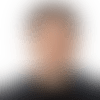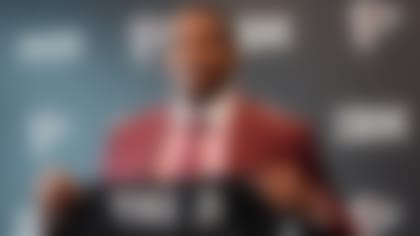DeAndre Hopkins and Hayden Hurst were both traded on Monday. They netted similar returns.
On a strange day in a strange world where the importance of football players swapping uniforms felt even more ephemeral than usual, the trade of Hopkins to the Cardinals for a second-round pick, running back David Johnson and a swap of fourth-rounders was the most dumbfounding.
Before getting to the rest of the winners and losers from a frantic first day of the pre-free agency negotiating window, the curious case of Texans general manager/coach/overlord Bill O'Brien must be examined. It didn't take long after the Hopkins trade to hear how there was friction with his head coach. This happens a lot with O'Brien, whether with greatplayers or executives. O'Brien always gets the last word.
Hopkins reportedly wanted a contract extension from the Texans despite having three years left on his current deal, perhaps further frustrating O'Brien. In most cities, the general manager would tell O'Brien to work out the relationship with one of the franchise pillars and let the front office deal with the contract. In Houston, O'Brien is the front office.
Trading Hopkins -- a 27-year-old on his way to Canton -- could have made sense if Houston got a reasonable return. The Texans have to pay Deshaun Watson and left tackle Laremy Tunsil soon. Plus, they have other holes on the roster. But in a world where Odell Beckham Jr. netted a first- and third-round pick in addition to a starting defender (Jabrill Peppers) a year ago, this deal reeks of emotion. What was the rush? David Johnson -- due $10.2 million guaranteed in 2020 -- was a negative asset. When I wrote about him last month, I suggested that a late-round pick swap in which the Cardinals had to take on some of Johnson's money would have been ideal. Instead the Texans sent Arizona the successor to Larry Fitzgerald for the next decade! All it took to get Hopkins -- a three-time All-Pro -- was a second-round pick. That's essentially what the Falcons sent to Baltimore for a disappointing 2018 first-round pick in Hurst, who has 43 career catches. Hopkins could have that many by October.
Here are some of the other big winners and losers from Monday's news:
Moving up
Kirk Cousins:Stefon Diggsmight beambivalent about Cousins. The Vikings are not. It's ironic that after hourly assessments on Cousins' worthiness as a "franchise quarterback" over the last five years or so, the two-year, $66 million extension Cousins agreed to on Monday morning was off the NFL.com homepage by early afternoon. In case it wasn't obvious enough, Cousins is the face of the Vikings franchise. While Mike Zimmer's defense is set to undergo an overhaul this offseason, the Vikes have shown their faith in Cousins in a way the Redskins never did.
Josh Allen: This was always going to be the year Bills coach Sean McDermott made his big push. Entering his third full offseason with general manager Brandon Beane, McDermott knew the Bills still needed more firepower around Allen for any chance to have a championship-level offense. Diggs couldn't be a better fit.
A complete receiver who doesn't need to be schemed open, Diggs' addition gives coordinator Brian Daboll all sorts of questions to pose to opposing play callers. The quintet of Diggs, deep threat John Brown, slot receiver Cole Beasley, tight end Dawson Knox and running back Devin Singletary form a dangerous group to run and gun with.
Vikings fans can't even be that mad. General manager Rick Spielman -- unlike Texans coach Bill O'Brien -- at least got commiserate value for a great player. Minnesota grabbed picks in the first, fourth (2021), fifth and sixth rounds in exchange for Diggs and a seventh. That was a big price to pay for Buffalo -- and a new contract for Diggs may be coming soon -- but it was still an excellent use of the assets (picks and cap space) they have been stockpiling. Trades really can be fair for both teams!
Amari Cooper: It took a protracted staring contest, but Cooper got the contract he wanted from the team he wanted. $100 million over five seasons with $60 million in guarantees is a deal befitting a top-10 receiver. He could have earned considerably more if he joined the Redskins, according to Michael Gehlken of the Dallas Morning News, which should only make the signing sweeter for Cowboys fans. Dak Prescott and Cooper are far better off together than apart, as are the tens of millions who will be watching them in prime-time games for much of the decade. If the Cowboys are going to be on, they may as well be entertaining.
The Colts' defensive identity: I'm surprised by the mixed reactions the Colts have received by sending their No. 13 overall pick in this year's draft to San Francisco in exchange for 49ers all-world interior defensive lineman DeForest Buckner. It was an incredibly expensive move after the Colts gave Buckner a contract extension worth $21 million per season, according to NFL Network Insider Ian Rapoport, but draft assets and cap space are only valuable if you do something with them.Colts general manager Chris Ballard has enjoyed plenty of picks over the last few years, many of them terrific. What Ballard couldn't find was a difference-making defensive lineman. Buckner is a versatile, top-five interior player in the prime of his career. The Colts have ultimately had too much cap space the last few years, without the stars to spend it on. Buckner is worth the money, someone who made his teammates around him better in San Francisco.
The move was understandable from the 49ers' side, if an unfortunate side effect of a talented, well-paid roster. After handing Arik Armstead nearly the same five-year, $85 million contract Monday that the team gave Dee Ford a year ago, the 49ers didn't have room for Buckner. Armstead is not the same player as Buckner, but he came at a cheaper price and also provides versatility. The mistake, in hindsight, was giving up a second-round pick and a big deal for Ford, who has struggled to stay on the field for much of his career. But the 49ers did well to get a premium pick in this Buckner deal and can use their two first-rounders to trade down or replenish their roster with top-shelf talent in April. (The 49ers still don't have picks in the second, third or fourth rounds in 2020.) The 49ers could afford to lose Buckner because their defensive line remains deep and the core of their team. Now it's on general manager John Lynch to make the pick he received count.
The tight end market:Austin Hooper is a good starting tight end. He's just not a difference-maker, which is why he ended up on my list of players who could be overpriced in free agency. The Cleveland Browns made Hooper the highest-paid player at his position -- four years for $44 million -- despite the last two seasons in which he has combined to average under 10 yards per catch. Like a running back who gains what is blocked for him, Hooper has reliable hands and isn't a big playmaker. He also lacks the blocking ability to be a true matchup problem and rarely draws double teams. Hooper will undeniably give Baker Mayfield another solid receiving threat and forms an intriguing tight end duo with David Njoku, but his contract was great news for the rest of the tight ends in the league.
Look for George Kittle, Hunter Henry, Travis Kelce and O.J. Howard to eventually top Hooper's contract. Even a mid-level player like Blake Jarwin was able to get a three-year extension worth up to $24.5 million on Monday from the Cowboys, despite being a year away from unrestricted free agency.
The potential tag-and-trade market: Last year, three (out of six) players were traded after receiving the franchise tag. I wouldn't expect that high a percentage for the 13 players who received the franchise tag this year, but there are plenty of movable assets. Yannick Ngakoue and Matt Judon appear to be the most likely to be dealt, but Vikings safety Anthony Harris, Chiefs defensive tackle Chris Jones and Patriots guard Joe Thuney are also possibilities.
Offensive linemen getting paid:Ereck Flowers, long a punchline, received $10 million per season (for three years) from Miami. The Patriots rarely use the franchise tag, much less for guards, but are willing to pay Thuney over $14 million in 2020. The Browns agreed to terms with right tackle Jack Conklin on a three-year, $42 million contract that looks altogether reasonable in this market. He's a strong starter if healthy. Dennis Kelly returned to Tennessee, Halapoulivaati Vaitai went to Detroit, and Graham Glasgow is headed to Denver on Day 1 deals with some eye-popping numbers. In short: A great offensive line coach and system are perhaps the most undervalued resources in the NFL. Teams struggle to develop quality linemen, so they are often forced to take big risks in free agency and hope for the best.
Marcus Mariota: It's one thing for Mariota to land in Oakland as Derek Carr's presumptive backup. It's another for general manager Mike Mayock and coach Jon Gruden to make Mariota a Day 1 priority.
While Carr could view the Mariota move as his best chance to keep the Raiders' job -- surely Tom Brady or a top draft pick would be a bigger threat -- there is little reason to think Gruden will have patience with Carr if the Raiders get off to a slow start next season. If the Raiders are 2-4, I'd expect to see Mariota hit the field just like Ryan Tannehill did when the Titans were struggling last year.
There are a lot of reasons to believe Carr is a vastly superior player and should hold on to the gig. But Mayock and Gruden outbid a reportedly competitive group of suitors for Mariota because they were intrigued. Gruden has done wonders with far less talented reclamation projects at the position before, so it's a nice landing spot for Mariota's second act.
Trending down
Franchise-tagged players who thought they'd be free agents: No one is going to lose sleep in sympathy for the 14 NFL players who received the franchise or transition tag by Monday's deadline, but there were at least a few who had to be very disappointed not to hit the open market. I mentioned Patriots guard Joe Thuney, who would have scored a massive signing bonus in free agency. The Titans didn't seem to be that serious about signing Derrick Henry long-term, preferring to go year to year with him. Chris Jones would be the highest-paid defensive player in football if he was let free, but the Chiefs smartly held on to him for $16.1 million on a one-year tender. The Bengals' A.J. Green ($17.8 million) and Cardinals' Kenyan Drake ($8.48 million on the transition tag) might have been the only players to be happy to get their one-year offers.
In all, the quantity of tagged players reflected a market where there was too much cap space and not enough great players. Even relatively risky options like Leonard Williams and Bud Dupree would have ultimately done better on the open market.
The Process in Miami: I'm a huge fan of cornerback Byron Jones, who Rapoport reports will make roughly $17 million annually to patrol the defensive backfield for the Dolphins. What that means for Xavien Howard's future in Miami remains to be seen after Howard's December arrest on a domestic battery charge. Building the defense from back to front is similar to what's worked in New England, and Jones is a fine place to start. The other Dolphins agreements on Monday provided less confidence.
Miami agreed to terms with two chronic underachievers -- offensive lineman Ereck Flowers and pass rusher Shaq Lawson -- on matching three-year, $30 million contracts. Be wary of former high draft picks who put together one good half-season stretch before getting paid in free agency. The description applies to both Flowers and Lawson. Kyle Van Noy, who agreed to a deal with the Fins on Monday night, can still play quality football, but the Patriots nabbed him when he was truly a bargain. He is no longer that at four years and $51 million, according to Rapoport.
The Falcons' talent base: Cutting Devonta Freemanmakes sense. Not paying to keep Austin Hoopermakes sense. I don't hate the Falcons for taking a chance by acquiring Hayden Hurst in a trade, even if the price was steep. Hurst flashed at times last season. Still, he's a downgrade from Hooper. The hardest Falcons news to understand was that they're planning to let go of cornerback Desmond Trufant. That's a head-scratcher, even if the Falcons have a lot of faith in their young cornerbacks. Trufant will land just outside the top 50 in our top 101 free agents when he's officially cut. These moves make sense taken one by one, but they reveal a team in transition after two disappointing seasons. It's remarkable to see how few players remain from the Falcons' Super Bowl run.
The Packers' right tackle position:Packers general manager Brian Gutekunst agreed to terms with former Lions right tackle Rick Wagner on a relatively affordable two-year deal on Monday, a rarity in the offensive line market. Still, going from Bryan Bulaga to Wagner is a significant downgrade.
NFL draft normalcy: It was only a matter of time until the NFL officially canceled the public-events portion of the NFL draft, which were to be held in Las Vegas. There is nothing normal about this world we're living in due to the COVID-19 pandemic, perhaps with the exception of the NFL transactions flying across the ticker on Monday.
The draft will still take place April 23-25 and will be televised, but the details regarding how it plays out remain to be determined. Then again, most everything remains "to be determined" in the NFL and beyond until further notice.
Follow Gregg Rosenthal on Twitter @greggrosenthal.












